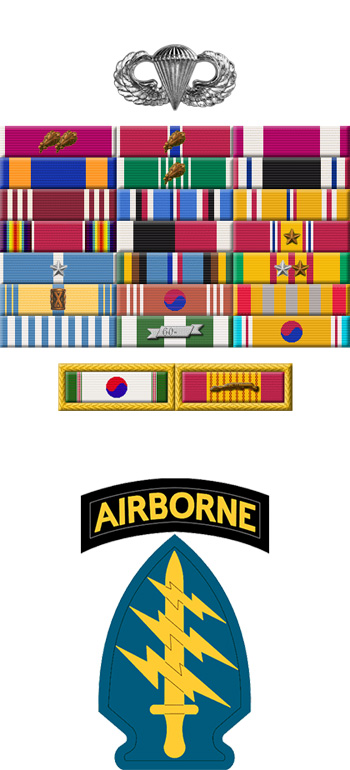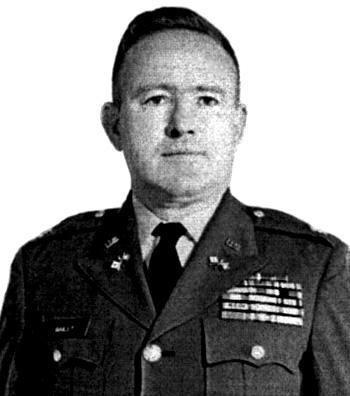
|
James V. Bailey |
 |
|||
| Rank, Service | ||||
Colonel O-6, U.S. Army |
||||
| Veteran of: | ||||
|
||||
| Tribute: | ||||
James Bailey was born on August 23, 1927, in Princess Anne County, Virginia. He enlisted in the U.S. Navy on November 4, 1944, and served as an Aviation Radioman until receiving an honorable discharge on November 19, 1947. He next enlisted in the U.S. Army on December 4, 1947, and served with the 4th Infantry Division at Camp Ord, California, from December 1947 to February 1948. Sgt Bailey deployed to Japan with the 511th Parachute Infantry Regiment in April 1948, returning to the United States with the Regiment in June 1949. He remained with the 511th at Camp Campbell, Kentucky, until July 1950, and then deployed with the 40th Anti-Aircraft Artillery Brigade to Korea in June 1950. Sgt Bailey transferred to C Battery of the 507th Anti-Aircraft Artillery Brigade in Korea in August 1950, and served with that unit until he was captured and taken as a Prisoner of War on May 18, 1951. After spending 837 days in captivity, SFC Bailey was released on August 31, 1953. He was briefly hospitalized to recover from his captivity at the U.S. Naval Hospital in Portsmouth, Virginia, from September to December 1953, and then attended Signal Corps Officer Candidate School at Fort Monmouth, New Jersey, where he received his commission as a 2nd Lt in the Signal Corps on February 26, 1954. Lt Bailey next completed the Signal Officer Basic Course at Fort Monmouth from February to June 1954, followed by service as an instructor there from June to July 1954. His next assignment was with the 77th Special Forces Group at Fort Bragg, North Carolina, from July 1954 to April 1956, and then with the U.S. Army Element of the Joint United States Advisory Group in Thailand from April 1956 to May 1957. After completing the Signal Officer Advanced Course, Capt Bailey served as an instructor with the U.S. Army Signal School at Fort Monmouth from July 1957 to September 1958, and during this time he deployed in support of the Military Assistance and Advisory Group in Iraq from October 1957 to February 1958. His next assignment was as Battalion Training Officer and Assistant Signal Officer with the 82nd Signal Battalion at Fort Bragg, North Carolina, from September 1958 to August 1960, followed by service as an Advisor with the U.S. Army Element to the Military Assistance and Advisory Group in Taiwan from August 1960 to October 1962. He served as Operations Officer and then Plans Officer with the XVIII Airborne Corps at Fort Bragg from October 1962 to July 1964, and then as a Signal Officer with the 5th Special Forces Group in South Vietnam from July 1964 to July 1965. Maj Bailey next served as a Signal Advisor and Division Chief with the Special Warfare Agency at Fort Bragg from July 1965 to July 1967, followed by service as Commander of the 509th and then 523rd Signal Battalion in South Vietnam from September 1967 to September 1968. He served as a Signal Officer with the 35th Signal Group at Fort Bragg from September 1968 to January 1969, and attended Armed Forces Staff College in Norfolk, Virginia, from January to July 1969. LtCol Bailey next served as a Special Warfare Staff Officer with Headquarters U.S. Army in the Pentagon from July 1969 to July 1971, and during this time he was a planner for Operation Ivory Coast, the Son Tay Raid to rescue American Prisoners of War in North Vietnam on November 21, 1970. Col Bailey's final assignment was as a Director, Deputy Commandant, and Special Assistant to the Commandant of the U.S. Army South Eastern Signal School at Fort Gordon, Georgia, from July 1971 until his retirement from the Army on December 31, 1973. James Bailey died on January 23, 2002, and was buried at Arlington National Cemetery. |
||||
|
||||

